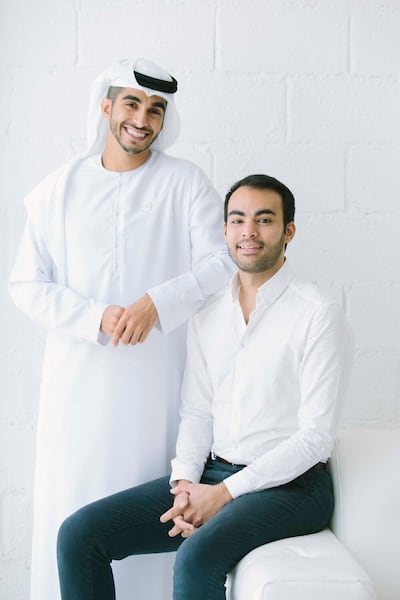Letswork, a UAE property technology start-up, aims to capitalise on growing demand for co-working spaces and expand its operations across the region.
This comes at a time when companies are adopting flexible working models in a post-pandemic world and looking to cut costs on renting office space amid high inflation.
The start-up was founded by Emirati Omar Almheiri and Pakistani Hamza Khan in 2018. The duo met as part of the E25 start-up initiative set up by Emaar founder Mohamed Alabbar to support aspiring entrepreneurs under the age of 25.
They decided to start the company as they felt there is a gap in the market in the co-working sector.
“It was Omar’s idea and he was looking at working on a co-working concept … actually building on our own brand of co-working spaces because at that time there were very few that were around in the UAE and on top of that, the WeWorks of the world were taking the world by storm,” says Mr Khan, who is also chief executive of the company.
“So, we saw this potential … but then we realised that we can achieve more scale and achieve more impact if we leverage existing assets around us, instead of setting up our own co-working spaces.”
The demand for co-working spaces is increasing month on month and “it is very exciting”, Mr Khan says. buy a membership for a day, week or month to work from its network of spaces.
The demand for co-working space is increasing month on month and “it is very exciting”, Mr Khan says.
“This year, especially, we are doubling down on corporate users.
“Companies are now realising that they don’t need massive 10,000 square feet [of office space] on Sheikh Zayed Road, which is being utilised 40 per cent.
“Instead, we are seeing a lot of companies downsizing their offices and opting for something a lot smaller and leaner and reducing their overheads.”
The value of co-working spaces worldwide is predicted to grow to $24 billion by 2030, from about $7 billion in 2021, a report by Next Move Strategy Consulting says.
A growing number of start-ups is driving the growth as they opt for co-working spaces to save on rising private office rents, the consultancy says.
“Co-working spaces are not only helping to reduce the cost of rent but also [provide] additional utilities such as desk, high-speed Wi-Fi connection, coffee, meeting rooms, recreation zones and many others,” the report says.

Letswork deals with freelancers, students and individual users, as well as small and medium enterprises, start-ups and companies looking for productive or flexible workspace arrangements for their employees.
These are the companies that have a full-time remote working policy or a hybrid system, where people come to the office for couple of days each week and work remotely on other days.
“We have over 40,000 members and 300 spaces in the UAE, which are a mix of hotels, cafes and co-working spaces in business centres. On top of that, we have a presence in Portugal where we have about 50 spaces. We have three spaces in Bahrain and eight in Spain,” Mr Khan says.
It plans to start operations in Saudi Arabia, the Arab world’s largest economy, in the first quarter of this year as it continues to expand and scale up its business amid growing demand.
“We have already signed a bunch of spaces and are hiring staff to launch operations in the kingdom,” he says.
The company raised $2.1 million in a seed round in December with the participation of investors such as US venture capital company 500 Global, Saudi Arabia’s The Space, the UAE’s DTEC Ventures and other angel investors.
“The purpose of this round was to help achieve milestones for the business … moving into Saudi [Arabia] and expanding there and building a sustainable business … just to scale up and achieve global growth and we do plan to raise more in future.”
Start-ups across the Middle East, Africa, Pakistan and Turkey raised $7.2 billion through 1,473 deals last year, despite macroeconomic and geopolitical uncertainty, according to a report by data platform Magnitt.
Turkey captured 23 per cent of total funding, driven by three big deals. The UAE was second, accounting for 16 per cent of funding, and Saudi Arabia followed with a share of 14 per cent, the report says.
Funding for Mena start-ups crossed the $3 billion mark last year, an annual increase of 8.3 per cent, according to Magnitt.
On competition in the market, Mr Khan says the company has an edge over others as it offers services to a wide variety of customers — from entrepreneurs to individual users.

“We have competitors in the US, Europe, the UK and South-East Asia … they only focus on co-working spaces while we are both B2B [business to business] and B2C [business to consumer],” he says.
Mr Khan says Letswork has entered into partnerships with co-working spaces, cafes and hotels.
“This gives us that extra variety of spaces because certain neighbourhoods may not have co-working spaces and we want to give the users the most comprehensive supply network of spaces where people can work from. So we are not limited like our competitors are,” he says.
Policies by the government, such as a one-year residence permit for remote workers in the UAE, are also expected to create more demand for co-working spaces and help the company boost its business.
In 2021, Sheikh Mohammed bin Rashid, Vice President and Ruler of Dubai, said overseas remote-working professionals could live in the Emirates while continuing to serve their employers in their home country.
“The UAE has always had an edge over the rest of the region because of just how much easier it is to do business here,” says Mr Khan.
“Because of the access to capital and the access to customers … the UAE is probably the most exciting place to be in.”
Q&A with Omar Almheiri and Hamza Khan, co-founders of Letswork
What successful start-ups do you wish you had started?
Mr Khan: I was always interested in the electric vehicle space and felt like a global subscription service for EVs would disrupt many industries related to vehicles.
What is your mantra for success?
Mr Khan: My number one rule is always to remain calm, even if things don’t seem like they are working out. There’s a reason you are at this point, but if you are calm you will be able to work through it.
Who is your role model in the business world?
Mr Khan: I would say Larry Page (co-founder of Google). His focus and ability to have everyone work in the same direction is something that only a few can do.
What new skills have you learnt while setting up your start-up?
Mr Khan: Everything from finance, legal, marketing. However, I think the one skill that I have picked up and I am still refining is how to manage a team. At the end of the day, without the Letswork team, we wouldn’t be here today.
What is your vision for the company?
Mr Khan and Mr Almheiri: Our vision is simple — become the first Emirati technology unicorn. We have built a product that is extremely scalable and have only just begun our expansion plans.
Are you a risk-taker or a cautious entrepreneur?
Mr Khan and Mr Almheiri: Start-ups are extremely risky and the people running them need to be risk-takers otherwise you won’t grow. We have got to a point where we make decisions based on data that we have collected.


